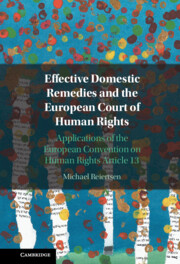 Effective Domestic Remedies and the European Court of Human Rights
Effective Domestic Remedies and the European Court of Human Rights Published online by Cambridge University Press: 11 August 2022
Chapter 11 accounts for the redress required by Article 13. The chapter demonstrates that in early case law the Court mostly limited itself to a statement that redress had to be provided, without any further specification. However, increasingly, in some specific contexts, the Court has laid down the form and specific measures required. But the Court's reasoning is very case specific. This makes it hard to deduce general and principled starting-points which can be applied to new cases. For example, the Court has not in a general manner required that the remedy needs to be able to put an end to continuing violations, with possible proportional exceptions, or set out any principled starting-points as to when compensation and/or restitution is necessary. Further, the the case law concerning effective investigations is particularly unclear. Indeed, even though the Court requires effective investigations under Article 13, it is highly unclear how this requirement relates to similar requirements under substantive Articles and to what extent effective investigations is percieved as a form of redress, as such.
To save this book to your Kindle, first ensure no-reply@cambridge.org is added to your Approved Personal Document E-mail List under your Personal Document Settings on the Manage Your Content and Devices page of your Amazon account. Then enter the ‘name’ part of your Kindle email address below. Find out more about saving to your Kindle.
Note you can select to save to either the @free.kindle.com or @kindle.com variations. ‘@free.kindle.com’ emails are free but can only be saved to your device when it is connected to wi-fi. ‘@kindle.com’ emails can be delivered even when you are not connected to wi-fi, but note that service fees apply.
Find out more about the Kindle Personal Document Service.
To save content items to your account, please confirm that you agree to abide by our usage policies. If this is the first time you use this feature, you will be asked to authorise Cambridge Core to connect with your account. Find out more about saving content to Dropbox.
To save content items to your account, please confirm that you agree to abide by our usage policies. If this is the first time you use this feature, you will be asked to authorise Cambridge Core to connect with your account. Find out more about saving content to Google Drive.